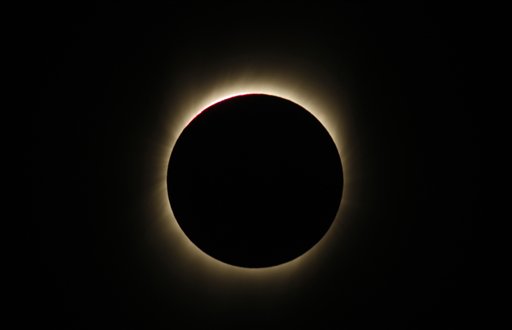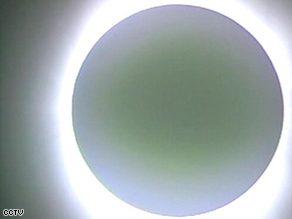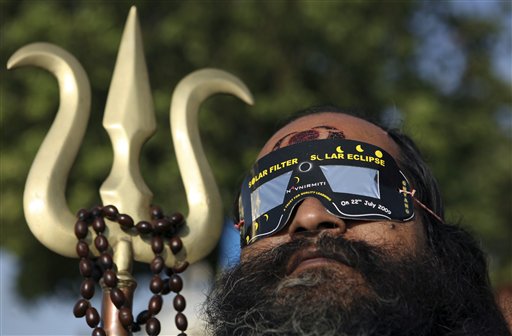
A total solar eclipse is seen in Varanasi, India, Wednesday, July 22, 2009. The longest solar eclipse of the 21st century pitched a swath of Asia from India to China into near darkness Wednesday as millions gathered to watch the phenomenon. (AP Photo/Saurabh Das)
Related article: Two killed in stampede during eclipse in India (China Daily)
Darkness falls in Asia during total eclipse, luring masses

State television in China broadcast this image of the eclipse.
(CNN) — The longest solar eclipse of the century cast a wide shadow for several minutes over Asia and the Pacific Ocean Wednesday, luring throngs of people outside to watch the spectacle.
Day turned into night, temperatures turned cooler in cities and villages teemed with amateur stargazers.
The total eclipse started in India on Wednesday morning and moved eastward across Nepal, Bangladesh, Bhutan, Vietnam, China and parts of the Pacific. Millions cast their eyes towards the heavens to catch a rare view of the sun’s corona.
Cloud cover in some areas prevented people from fully savoring the phenomenon. Still, many were awed.
Tim O’Rourke, a 45-year-old freelance photographer from Detroit, Michigan, lives in Hong Kong but traveled up to Shanghai — touted as one of the best spots to watch the eclipse. ![]() Watch the ‘exceptional’ eclipse »
Watch the ‘exceptional’ eclipse »
“It was pitch black like midnight,” said O’Rourke, standing in People’s Square with what appeared to be a crowd of thousands.
“Definitely not disappointed we came. Of course it would have been much better with nice weather, blue skies. But still it was a great experience, it was a lot of fun.” he said. ![]() Viewing the eclipse in pictures »
Viewing the eclipse in pictures »
Total eclipses occur about twice a year as the moon passes between the Earth and the sun on the same plane as Earth’s orbit. Wednesday’s event lasted up to more than six minutes in some places. ![]() Watch what a total solar eclipse entails »
Watch what a total solar eclipse entails »
- Solar eclipse scares Indian mothers-to-be
- Blog: Reflections on nature’s grand show
- Explainer: How eclipses work
In India, where an eclipse pits science against superstition, thousands took a dip in the Ganges River in the Hindu holy city of Varanasi to cleanse their souls, said Ajay Kumar Upadhyay, the district’s most senior official. Send us your photos of the eclipse
The ritual turned into tragedy when an 80-year-old woman died and eight others were injured in what was called a stampede in some media reports. Upadhyay called the incident a “commotion” during sacred rituals in Varanasi. ![]() Watch India’s reaction to the eclipse »
Watch India’s reaction to the eclipse »
“Apparently, the woman died because of suffocation and after that there was some commotion, in which some eight other elderly women were injured. But it was not a stampede-like situation,” Upadhyay told CNN.
It was sunny skies in Hong Kong for the eclipse, where students, parents and the elderly flooded a primary school to watch in the southern Chinese enclave.
The local astronomy society gave a presentation on how an eclipse happens and children climbed up ladders to look through two large telescopes on the school roof — packed with skygazers — to catch a glimpse of the moon moving across the sun. Read blog on Mother Nature conducting grand eclipse show
Others looked through binoculars covered with solar filter paper or through a large rectangular block labeled “Large Solar Filter,” where they could take pictures of the moon moving over the sun.
Astronomy enthusiast Louis Chung, 13, brought his teacher to the school to witness the eclipse.
“City folks wouldn’t usually be able to see this. Nature is wonderful. It is awesome to know that nature can provide such spectacular sights,” said Chung, a member of the Hong Kong Astronomical Society.
“Nature is incredible, and there is too much we don’t know about,” said another Hong Kong local, Yee Ping, a journalist for a financial newspaper. “We try to know more and see by our own eyes so we can feel the power of nature.”
Richard Binzel, an astronomer at the Massachusetts Institute of Technology, said the total eclipse will first be visible at sunrise in India and about four hours later just east of Hawaii. A partial eclipse will be visible as far south as northern Australia and as far north as Siberia, he said.
In some cultures, legends and folklore surrounds eclipses. ![]() Watch as eclipse-watchers head to China »
Watch as eclipse-watchers head to China »
In India, an eclipse is considered inauspicious. Women forbid pregnant daughters-in-law from going outside out of the belief that their children could be born with marks. Some temples won’t offer any prayers on the day of an eclipse — such as the one next to the planetarium in Mumbai, which said it won’t even light a stick of incense.
In Chinese tradition, there is a story about a heavenly dog eating the sun. As the story goes, people would make noise to scare off the dog and rescue the sun, said Bill Yeung, president of the Hong Kong Astronomical Society.
“In ancient China, we shared the same impression with our Indian friends that a solar eclipse was not a good thing,” he told CNN. Read blog on how eclipse-chasers are gambling on weather
Some of the more unusual ways to see Wednesday’s eclipse include a cruise ship that will travel along the centerline off Japan and from aboard a 737-700 chartered plane in India.
More conventional viewing parties in Shanghai had been planned along the beach, in a park and in skyscrapers. A music festival has been organized in Japan’s Amami island, with more than 6,000 people expected, and Japanese television has shown rows of tents set up on Akusekijima island.
The witnesses of the eclipse will range “from the farmer who only knows legends of eclipses and may not know this is happening at all to the world’s experts who have come specifically to the Shanghai region to make the most detailed scientific analysis possible,” added Binzel, the MIT astronomer. iReport.com: Solar eclipse as seen from a Buddhist temple
Bob Johnson, of Sasketchewan, Canada, applied for his first passport to come and see the eclipse in Shanghai.
“During totality, we didn’t see anything. We saw up to 60 percent partial eclipse but then the clouds came in and it downpoured,” said Johnson. “I am not really disappointed. I’m a lot happier than yesterday because I didn’t think I’d see anything. The partial was beautiful.”
July 22, 2009
Source: CNN
Source: AP
Solar eclipse shrouds Asia in daytime darkness

A Sadhu, or Hindu holy man, watches the solar eclipse through specially-designed viewing glasses in Allahabad, India, Wednesday, July 22, 2009. The longest solar eclipse of the 21st century pitched a swath of Asia into near-darkness after dawn, as millions watched the once-in-a-lifetime phenomenon Wednesday. (AP Photo/Rajesh Kumar Singh)
TOKYO, Japan — Millions of Asians turned their eyes skyward Wednesday as dawn suddenly turned to darkness across the continent in the longest total solar eclipse this century will see. Millions of others, fearing a bad omen, shuttered themselves indoors.
Chinese launched fireworks and danced in Shanghai. On a remote Japanese island, bewildered cattle went to their feeding troughs thinking night had fallen. And in India, a woman was crushed as thousands of viewers crowded the banks of the Ganges for a glimpse.
Starting off in India just after dawn, the eclipse was visible across a wide swath of Asia before moving over southern Japan and then off into the Pacific Ocean. In some parts of Asia, it lasted as long as 6 minutes and 39 seconds.
The eclipse is the longest since July 11, 1991, when a total eclipse lasting 6 minutes, 53 seconds was visible from Hawaii to South America. There will not be a longer eclipse than Wednesday’s until 2132.
The celestial event was met by a mixture of awe, excitement and fear.
Cloudy skies and rain damped the show in many areas, but villagers in the town of Varanasi, on the banks of the Ganges in India, got one of the best views.
Thousands of Hindus took to the waters to cleanse their sins. The eclipse was seen there for 3 minutes and 48 seconds.
The gathering was marred when a 65-year-old woman was killed and six people injured in a stampede at one of the river’s banks where about 2,500 people had gathered, said police spokesman Surendra Srivastava. He said it is not clear how the stampede started.
Others in India, though, were gripped by fear and refused to come outdoors. In Hindu mythology, an eclipse is caused when a dragon-demon swallows the sun, while another myth is that sun rays during an eclipse can harm unborn children.
“My mother and aunts have called and told me stay in a darkened room with the curtains closed, lie in bed and chant prayers,” Krati Jain, 24, who is expecting her first child, said in New Delhi.
Clouds obscured the sun when the eclipse began. But they parted in several Indian cities minutes before the total eclipse took place at 6:24 a.m. (0054 GMT; 8:54 p.m. EDT).
On the tiny Japanese island of Akuseki, where the total eclipse lasted 6 minutes and 25 seconds, more than 200 tourists had to take shelter inside a school gymnasium due to a tornado warning.
But when the sky started to darken, everyone rushed out to the schoolyard, cheering and applauding, said island official Seiichiro Fukumitsu.
“The sky turned dark like in the dead of the night. The air turned cooler and cicadas stopped singing. Everything was so exciting and moving,” Fukumitsu said.
Some villagers reported that their cows gathered at a feeding station, apparently mistaking the eclipse as a signal that it was dinner time, he said.
“It was rather mysterious,” he said. “It must have been a frightening experience for people hundreds of years ago.”
Jubilant eclipse watchers in China set off fireworks near the banks of the Qiantang River in coastal Zheijiang province as skies darkened overhead for about six minutes. Visitors from countries including Britain, Germany and Australia joined curious Chinese onlookers. Heavy clouds blocked the full eclipse but watchers saw a partial one.
The river bank in Yanguan village drew an exceptional number of watchers because it was also the site of the world’s largest tidal bore, a phenomenon triggered by the eclipse where a giant tidal wave runs against the river’s currents.
In Beijing, a thick blanket of grayish smog blotted out the sky.
In coastal Shanghai, eclipse watchers were disappointed by a light drizzle in the morning. As the sky darkened fully for about five minutes, however, watchers became excited.
Holding a big green umbrella and wearing special glasses, Song Chunyun was prepared to celebrate the occasion in a new white dress.
“Although the rain came, I don’t want to screw up the mood. I want to enjoy the special day,” she said before dancing and singing in the rain with her two sisters.
At a Buddhist temple in the Thai capital Bangkok, dozens of monks led a mass prayer at a Buddhist temple to ward off evil.
“The eclipse is bad omen for the country,” said Pinyo Pongjaroen, a prominent astrologer. “We are praying to boost the fortune of the country.”
In Myanmar, Buddhists went to Yangon’s famed Shwedagon pagoda to offer flowers, fruits and water to ward off misfortune. Some warned their friends and family not to sleep through the eclipse for fear of getting bad luck.
“We all got up early this morning and prayed at home because our abbot told us that the solar eclipse is a bad omen,” said a 43-year old school teacher Aye Aye Thein.
Bangladeshis also came out in droves.
“It’s a rare moment, I never thought I would see this in my life,” said Abdullah Sayeed, a college student who traveled to Panchagarh town from the capital, Dhaka.
He said cars in the town needed to use headlights as “night darkness has fallen suddenly.” People hugged each other and some blew whistles when the eclipse began.
Total eclipses are caused when the moon moves directly between the sun and the earth, covering it completely to cast a shadow on earth.
On the Net:
* Eclipses Online: http://www.eclipse.org.uk/
* Mr. Eclipse: http://mreclipse.com/
By ERIC TALMADGE (AP)
July 22, 2009
how long would it take for an infinite solar eclipse to kill us all on earth?